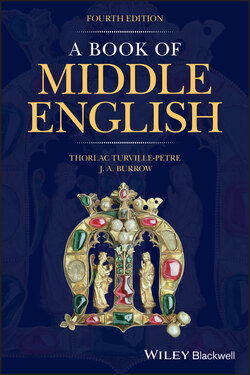Читать книгу A Book of Middle English - J. A. Burrow - Страница 87
5.10 Recapitulation and Anticipation
ОглавлениеA pronoun may recapitulate or anticipate a clause or a noun phrase. There are some good examples of this in Piers Plowman. In prestes and oþer peple towarde Peres they drowe, 7b/190, they stands for the noun phrase which is separated from its verb. In meschef hit maketh they ben so meke, 7b/212, hit anticipates the clause that follows. In ho‐so beste wrouhte / He sholde be huyred, 7b/120–1, He sums up the preceding clause ‘whoever did best’, and the same structure is seen in þat was bake for Bayard hit may be here bote, ‘what was baked for Bayard, (it) may be their salvation’, 7b/178. In alle þat grat in thy gate for Godes love aftur fode / Part with hem of thy payne, 7b/284–5, the inflected form hem both sums up the clause of l. 284 and establishes its dependence on Part with. The same structure, again with an imperative verb, is illustrated from the York Play: this traitoure here teynted of treasoune / Gose faste and fette hym, 15/77–8.
